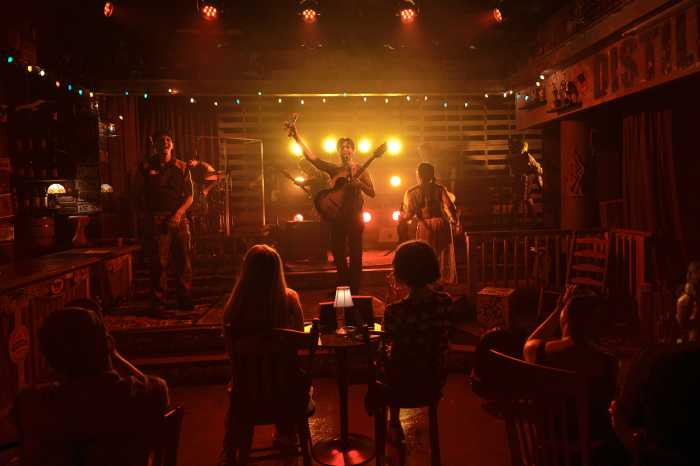BY ANDY HUMM | You know you're in trouble when you get mooned by the star before anything else happens in the National Theatre of Scotland's production of Euripides' “The Bacchae.” John Tiffany – who gave us the much-lauded “Black Watch” last year – directs a new version written by David Grieg that opens the Lincoln Center Festival 08.
The bum belongs to Alan Cumming, the theater's go-to guy for androgyny these days, as Dionysus. With his black wavy wig, gold lame kilt, and hairy legs he looks like the love child of Liz Taylor and Rocky Graziano – impish, devilish, saucy, and pugnacious all at once.
THE BACCHAE
Lincoln Center Festival 08
Rose Hall, Time-Warner
Building, 5th fl.
Columbus Circle
Jul. 10-13 at 8 p.m.;
Jul. 12 at 2 p.m., Jul. 13 at 3 p.m.
$35-$90;
http://www.lincolncenter.org Or 212-875-5456
Cumming's command of the vast stage in his opening monologue promises an intense theatrical experience that will also keep us off-balance with gender-bending and malevolent humor, perhaps too much so for its own good.
This play has always been a twisted, bloody mess since it first went up in 405 B.C. and it is not for the feint of heart, especially — spoiler alert! — when the backdrop erupts into a wall of real flames sending a massive heat wave clear to the back of the house.
Alan Cumming rocks Euripedes' “Bacchae,” but is it good for the Greeks?
“Too much?” Dionysus asks us wryly, but most of this take on “The Bacchae” is too little. We are, after all, being asked to grapple with big questions of divinity, worship, nobility, and human sacrifice. How do we appease the gods — or, in the special case of Dionysus a man-god — especially when we're not sure who's got the right stuff? For all the madness on stage, it's a serious existential question even for us atheists who must still grapple with which powers to respect – Nature? The state? The boss? – and which to ignore.
Violence is serious, too, and can indeed sometimes provoke howls of stunned, rueful laughter. Think of films like the over-the-top “Hostel” series about young people getting cruelly tortured, where if you didn't laugh you'd have to leave. But when the violence is always being winked at as it is in this production, the jokes prevent the impact of the evil from hitting us in the gut.
Pentheus (Cal MacAninch), the prince who won't recognize Dionysus as a god, cross-dresses in order to disguise himself so he can get to see the women who lustily worship Dionysus — the Bacchae — ritually cavort, but he plays it campy and with an uncomfortable hint of equating transgenderism with corruption.
In the dominant theatrical conceit, the Bacchae here are a chorus of black, female, red-gowned back-up singers, which worked in “Little Shop of Horrors” but not in this big tragic cauldron. Writer Grieg has written some compelling poetry for them, but it is not enhanced by their R& B songs or their surprisingly static stage presence.
When Dionysus' aunt Agave (Paola Dionisotti) comes on with the head of her son, Pentheus, whom she has unwittingly torn apart – don't ask – she seems stoned. (Too much Dionysian wine?) Pentheus' grandfather Cadmus recognizes the bloody visage and snaps Agave back into reality, but neither gives off the kind of horror and sorrow appropriate to such a baleful circumstance.
This “Bacchae” ends with a depressing, but trenchant admonition from the chorus: “No, you can't choose the gods that you worship/ you just have to worship them all/ No, you can't choose which prayers they will answer/ you just have to answer their call.” That's worth pondering, but unfortunately I spent most of my time thinking about when this otherwise talented group of people was going to deliver.


































